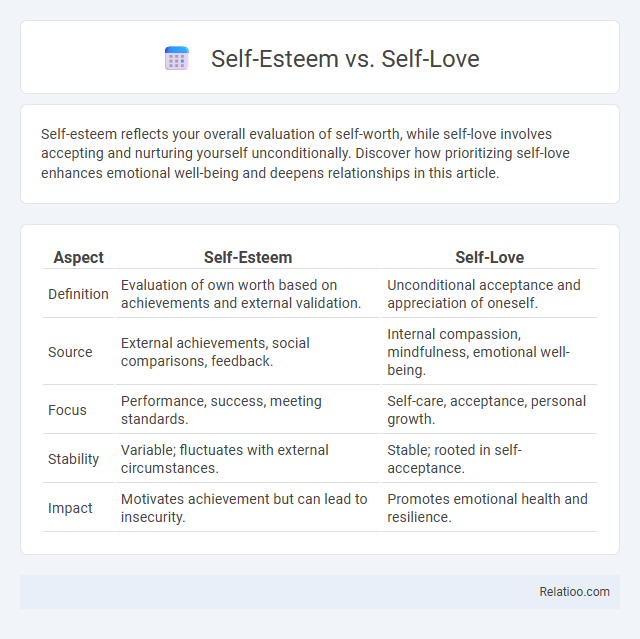Self-esteem reflects your overall evaluation of self-worth, while self-love involves accepting and nurturing yourself unconditionally. Discover how prioritizing self-love enhances emotional well-being and deepens relationships in this article.
Table of Comparison
| Aspect | Self-Esteem | Self-Love |
|---|---|---|
| Definition | Evaluation of own worth based on achievements and external validation. | Unconditional acceptance and appreciation of oneself. |
| Source | External achievements, social comparisons, feedback. | Internal compassion, mindfulness, emotional well-being. |
| Focus | Performance, success, meeting standards. | Self-care, acceptance, personal growth. |
| Stability | Variable; fluctuates with external circumstances. | Stable; rooted in self-acceptance. |
| Impact | Motivates achievement but can lead to insecurity. | Promotes emotional health and resilience. |
Understanding Self-Esteem: Definition and Importance
Understanding self-esteem involves recognizing it as the confidence and value you assign to yourself based on your abilities and worth. High self-esteem fosters resilience, motivation, and emotional well-being, while low self-esteem can hinder personal growth and mental health. Developing self-esteem is crucial for building self-love and enabling deeper self-discovery, empowering you to navigate life's challenges with confidence and authenticity.
What Is Self-Love? A Deeper Look
Self-love is an essential practice of valuing and accepting yourself unconditionally, fostering emotional resilience and inner peace. Unlike self-esteem, which often depends on external validation, self-love stems from within, nurturing your overall well-being and personal growth. Embracing self-love encourages deeper self-discovery, helping you understand your true desires and boundaries while cultivating a compassionate relationship with yourself.
Key Differences Between Self-Esteem and Self-Love
Self-esteem is the evaluative judgment of one's worth based on external achievements or approval, whereas self-love is an unconditional acceptance and compassionate regard for oneself regardless of circumstances. Self-esteem fluctuates with success and failure, while self-love remains steady as a foundation for emotional resilience. Self-discovery supports both by fostering deeper awareness of personal values, strengths, and authentic desires.
How Self-Esteem Influences Our Daily Lives
Self-esteem shapes our confidence, decision-making, and resilience in daily interactions by influencing how we perceive our worth and capabilities. High self-esteem fosters positive relationships and effective stress management, while low self-esteem can lead to self-doubt and social withdrawal. Understanding the distinction between self-esteem, self-love, and self-discovery helps individuals cultivate healthier mindsets and emotional well-being.
The Role of Self-Love in Mental Well-being
Self-love plays a crucial role in mental well-being by fostering resilience, reducing stress, and enhancing emotional stability, which distinguishes it from self-esteem and self-discovery. While self-esteem reflects your sense of worth based on external achievements and self-discovery involves exploring your identity, self-love prioritizes unconditional acceptance and compassion towards yourself. Cultivating self-love supports healthier coping mechanisms and strengthens your overall psychological health.
Signs of Healthy Self-Esteem vs Genuine Self-Love
Signs of healthy self-esteem include confidence in abilities, resilience to criticism, and setting realistic boundaries, which reflect a balanced self-perception based on external achievements and feedback. Genuine self-love manifests through unconditional self-acceptance, prioritizing emotional well-being, and practicing self-compassion regardless of external validation. While self-esteem often fluctuates with success or social approval, self-love provides a steady foundation for self-discovery and authentic personal growth.
Common Misconceptions: Self-Esteem and Self-Love
Self-esteem often gets confused with self-love, yet self-esteem is primarily about confidence in one's abilities and worth, while self-love embodies a deeper acceptance and nurturing of oneself regardless of external achievements. A common misconception is that high self-esteem means unconditional self-acceptance, but self-esteem can fluctuate based on success or failure, whereas self-love remains stable through life's challenges. Understanding this distinction is crucial for personal growth and authentic self-discovery, as cultivating self-love fosters resilience beyond the temporary boosts or drops in self-esteem.
Practical Ways to Build Self-Esteem
Building self-esteem involves setting achievable goals, practicing self-compassion, and acknowledging your accomplishments to reinforce a positive self-image. Focus on developing self-awareness through journaling or mindfulness to understand your strengths and weaknesses, which supports self-discovery and nurtures self-love. Consistently challenging negative thoughts and surrounding yourself with supportive people can amplify your confidence and promote lasting personal growth.
Strategies to Cultivate Self-Love
Cultivating self-love involves intentional strategies such as practicing daily affirmations, setting healthy boundaries, and engaging in self-care routines that nurture mental and physical well-being. Mindfulness meditation and reflective journaling support self-awareness, allowing individuals to identify and challenge negative self-beliefs, fostering acceptance and compassion. Incorporating gratitude exercises and seeking supportive social connections can reinforce a positive self-image and deepen emotional resilience.
Finding Balance: Integrating Self-Esteem and Self-Love
Balancing self-esteem and self-love involves recognizing your worth through achievements while embracing unconditional acceptance of yourself. Cultivating self-esteem boosts your confidence and motivates growth, whereas self-love nurtures compassion and emotional resilience. You can achieve harmony by integrating these dimensions during your self-discovery journey, fostering a holistic sense of inner well-being and authentic happiness.

Infographic: Self-esteem vs Self-love
 relatioo.com
relatioo.com